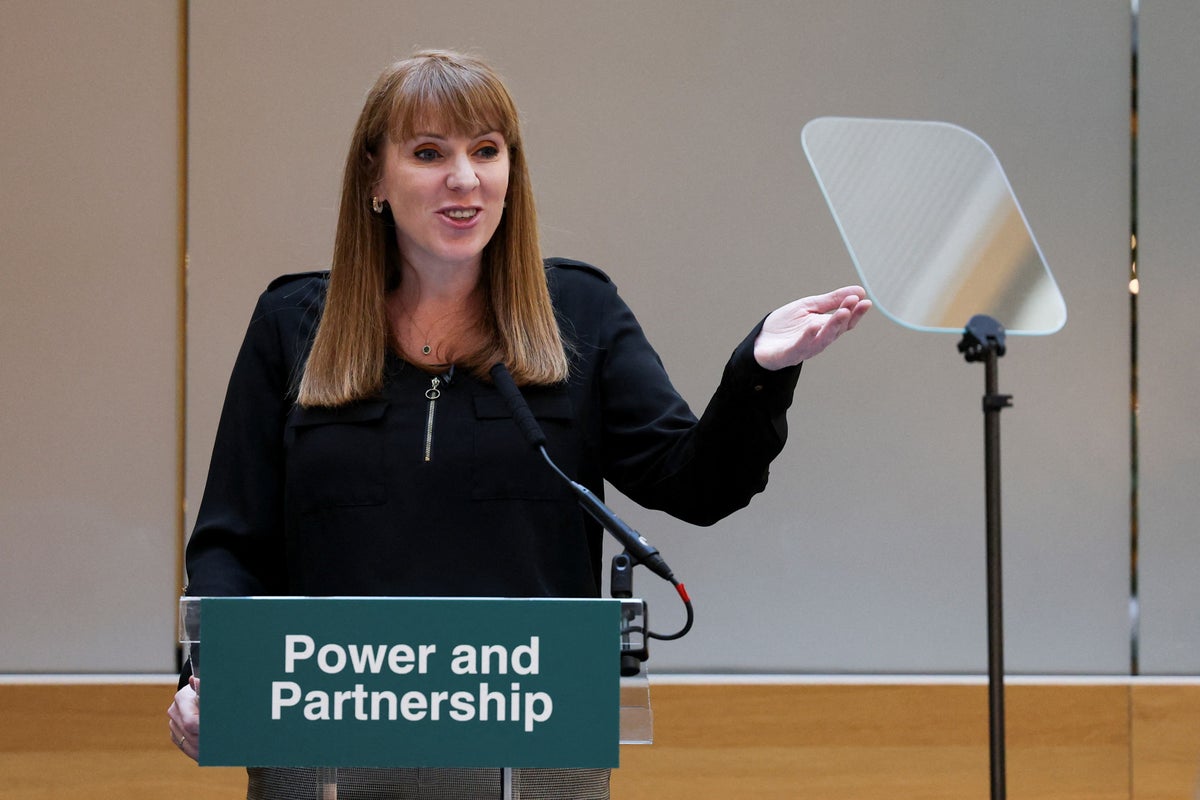
Devolution will be “default in our constitution” rather than “at the whim of a minister in Whitehall”, Angela Rayner said as she launched plans to overhaul local government.
Under the reforms published on Monday, two-tier council areas will be abolished, and every region of England will be covered by new “strategic authorities”, similar to the regions which currently have elected regional mayors.
Critics of the plans have however warned they could create “mega councils” and erode power at the most-local levels.
Deputy Prime Minister Ms Rayner said the Government was “taking a step towards relighting the fire in our great regions”, and that the proposals would create “an economy and a society that works for everyone”.
During a speech at the launch of the Government’s devolution White Paper, Ms Rayner said the UK is the “most centralised” country in Europe, with “too many decisions affecting too many people made by too few”.
Devolution will no longer be agreed by the whim of a minister in Whitehall. It will now be default in our constitution
She said: “In micromanaging by central Government and short-term sticky-plaster politics, you’ve got a doom loop of real problems going unaddressed in Britain’s regions. And there’s huge potential that’s unrealised.”
She added: “Devolution will no longer be agreed by the whim of a minister in Whitehall. It will now be default in our constitution.
“We are moving away from an ad-hoc system and towards a simpler and more ambitious framework for devolution.
“We will make it clear which powers go with which type of authority.
“We will bring new efficiency and accountability to local and regional government, and we will truly empower the local champions who understand their area, its identity, its strength and how to harness them.”
She continued: “There is really no good reason for ministers to sign off cattle grids or new cycle lanes.”
Those critical of the plans include the District Councils Network, which warned of the risk of removing localised decision making.
In areas with two-tier local governments, county council areas are subdivided into independent district councils. There are 164 district councils in England.
Local services are split in those areas, with county councils managing social care, waste disposal and major transport matters, while the smaller districts deal with planning applications, bin collections, and leisure facilities.
“We’re concerned that any creation of mega councils will prove the opposite of devolution, taking powers away from local communities, depriving tens of millions of people of genuinely localised decision making and representation,” councillor Hannah Dalton, vice chairwoman of the network, said.
She said there was little evidence that such reorganisations had saved money in the past.
Simon Kaye, policy director at think tank Reform, said the White Paper was a “welcome start”, but that strategic authorities needed wider powers, including the ability to raise taxes.

He added: “There is also a risk that plans to abolish district councils will leave local neighbourhoods feeling even more neglected. The result of reforms cannot be simply the creation of ‘mini Whitehalls’ at a regional level – communities need a real say.”
Council areas which would be impacted by the changes are expected to receive letters from the Government in the new year.
The first new strategic authorities could be set up by 2027 and will for the most part cover areas with a population of 1.5 million or above.
Downing Street insisted the changes would give more powers to local areas, improve accountability and tackle waste.
“The plans that we’re setting out today are all about giving power from Westminster to local leaders to make sure that they’ve got the levers they need to drive growth, but it’s also about having the right structures at a local level in place that means that local areas are delivering services that people care about in an efficient manner,” the Prime Minister’s official spokesman said.
Some local elections planned for May could be postponed for councils undergoing a process of reorganisation.

Local ballots scheduled for that month would only be delayed at the request of councils that wanted to reorganise under devolution plans “to the most ambitious timetable”, Downing Street said.
The assumption is that all elections will go ahead, but No 10 could not give a deadline for when councils would need to decide whether to hold a local election.
Ms Rayner said any delays to local polls “wouldn’t be for longer than a couple of months, a year”.
The Conservatives accused the Labour Government of plans to “strip councils of their powers to make choices and to impose reorganisation from Westminster without local consent”.
A party spokesman said: “The Conservatives delivered over one million new homes in the last parliament, and whilst we recognise the need to build more, these must be in the right places.
“This new announcement will do nothing to solve that, and instead open up another front on Labour’s assault on the countryside.”







